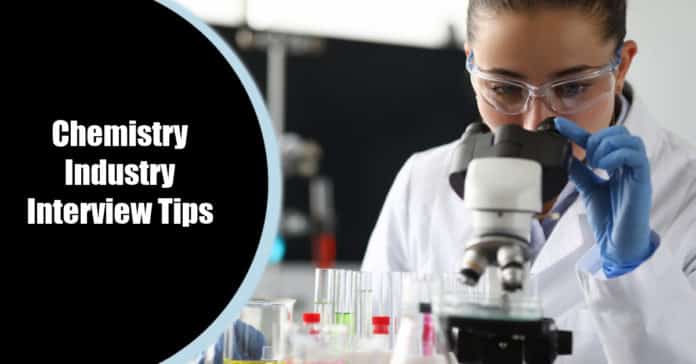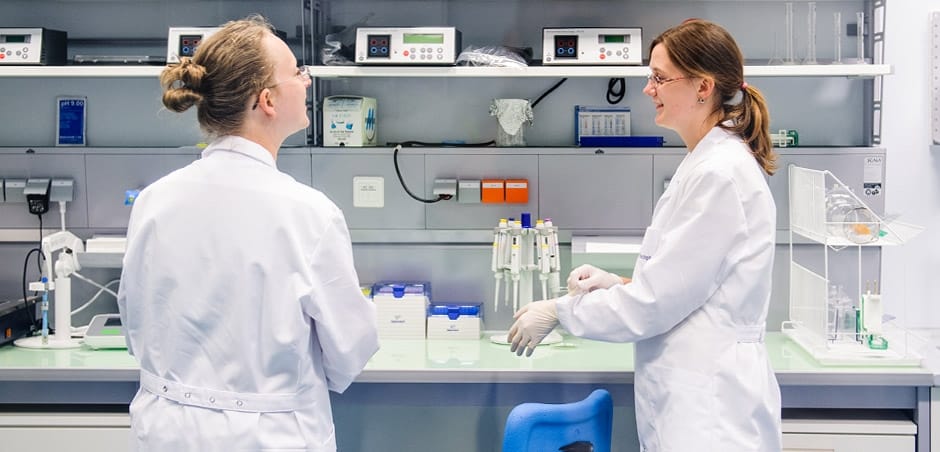Chemistry Industry Interview Tips
The chemistry industry offers massive opportunities for career initiation and growth. A job seeker in any field inadvertently thinks of the interview. An interview is often the final stage of the recruitment, and messing it up could cost you dearly. An interview for a chemistry job could be only slightly or vastly different from any other interview. It majorly depends on the recruiter, the company, the position that you’ve applied for. An interview gone well could not only get you your dream job but also lead you to unexpected perks, depending on how well you do at that time. Here are a few tips to ace your interview for the chemistry industry and bag your ticket into it.
- Plan to start well
Golden opportunities are often lost when you fail to plan. Once you receive information about being selected for an interview, start planning. If you hate planning and just go with the flow, at least make sure you’re prepared for it. A job interview is no joke. It means that the company has preferred your credentials over many others and has seen enough potential to allow you to be a part of them. So make
a note of important information like the time of the interview, venue, dress code (if any), things to be brought to the interview (IDs, documents, photos, letters of recommendation, or even a pen), and decide on means of transport, the time required, printouts or photocopies to be taken, etc.- Time management and Attire
Never be late for an interview. Some interviewers may let such an action go with/without an explanation, but you cannot expect such luck everywhere if you’re a tardy one. A chemistry company with its skill for analysis and meticulosity obviously gives due importance to time management. Be at least 30 minutes early for an interview, online or offline. It is important to dress to impress and be comfortable at the same time. Make sure your clothes appear professional and neat. You may wear a piece of jewelry or a tie to enhance your outfit but avoid funky accessories.
- Be confident, polite, and articulate.
Being professional involves the use of good language and mannerisms. During an interview for the chemistry industry, recruiters analyze everything you do in that period of time, including how you walk, talk, greet, express, and posture. Walk inside confidently and greet the interview panel. Remember to smile whenever appropriate, for smiling reduces tension within and between the people in the room. No one wants a rude person working for them. Therefore, while confidence is key to acing a job interview, also be polite and humble. Make sure that your speech has both clarity and credibility. Avoid stuttering, stalling, and repetition, as interviewers who could have about 15-20 interviews lined up may lose patience and interest. Think before you speak and structure your sentences clearly.
- Know your basics
Do not lose touch with your fundamental knowledge of chemistry. That doesn’t only mean theoretical knowledge. Since you’re joining the industry, you need to be thorough with the basics of practical chemistry. So brush up with whatever information is necessary before the interview. Fundamental questions such as “What is one mole?” and “How would you detect (particular compound)?” may be asked. You don’t have to panic and attempt to read the entire syllabus. Just go through some basic concepts related to the company’s work and the job description.
Skills required in the chemistry industry:
- Critical analysis and problem-solving skills – These are vital skills for any chemist who has to design and conduct laboratory experiments as part of a research project. Identification of a problem is the first step, followed by using logical thinking to come up with a practical solution after a series of trial and error experiments.
- Reading Comprehension – Work-related documents need to be read carefully and understood to carry out instructions.
- Listening and speaking skills – This is a pretty generic requirement but in the chemistry industry, you need to be extra observant so as to not miss out on any instructions or notifications. You also need to be good at speaking in order to communicate effectively with colleagues and higher-ups.
- Mathematics – As u know, a lot of chemical problems require knowledge of fundamental mathematics.
- Active learning – As a chemist, you need to constantly stay up-to-date with the current chemical techniques and advancements in research. This is also one of the things expected during an interview for the chemistry industry.
- Precision and meticulosity – In order to carry out proper chemical testing with specified particulars such as ingredients added, operating temperatures, mixing time, etc., you need a good and precise sense of observation, along with legible and detailed noting down of results.
- Quality control analysis – Evaluation of performance or quality is done by conducting inspections and tests of processes, services, or products
- Monitoring – Making improvements or corrective actions with regards to the performance of the organization, yourself, and other individuals.
- Systems analysis and evaluation – Determining systemic changes with environmental modification and evaluating its performance with the help of certain indicators relative to the goals of the system.
- Management of resources – A chemist needs to possess an acute awareness of resource availability and usage and whether they need to be replaced or replenished.
- Troubleshooting – A chemist is required to analyze operating errors and find quick ways of solving them.
- Time management – A chemist is supposed to have decent time management skills for his and others’ benefit.
- Talk about your experience and research.
The interviewer has your educational qualifications and experience on your resume right in front of him. Even if you repeat what he now knows, improve on it by talking about the interesting things that you learned during the process- things that will help you in your future. Your involvement in internships, research projects, scientific conferences, symposiums, etc., proves to them your interest in the practical application of your skills. Remember the names of your guides during these events as well.
- Apply your knowledge to the questions they ask
As a company that is all about the chemical sciences, they may ask you to analyze and solve a couple of subject-related problems. Stay calm and use your knowledge to come up with solutions. Many interviewers would even welcome out-of-the-box solutions.
Possible technical questions during an interview for the chemistry industry include:
- Explain the terms diluent and aliquot.
- What is one mole?
- What is titration?
- Tell me the difference between distillation and fractionation.
- Have you had any experience handing a mass spectrometer/gas spectrometer/HPLC unit?
- What are the preliminary tests performed during salt analysis?
- What is the composition of iron ore?
- How would you calculate the pH of a solution?
- What equipment have you used during your project work?
- What are the advancements in analytical techniques you are aware of?
- Learn about the company
This is one of the most important tips for your interview for the chemistry industry. Study up about the company and the position you’re applying for. Read your job description carefully. You can also quote points from it when they ask you why you want to work in their company.
- Set your goals straight
It is not only important to revise what you’ve learned in the past and read up about the company, but you also need to know yourself and make sure they align with the company’s interests. Your answer to a question on why you want to become a chemist could include an anecdote or a short story of recollection that describes how you developed an interest in your chosen field. A company usually invests in someone who would stay for a while after getting trained. You may give answers like, “I plan to stay as long as I can grow in the company and contribute to its advancement.”.
- Strengths and Weaknesses
This is often the hard part for many. Identify relevant strengths and weaknesses before you go for an interview. Be honest with your answer, but also humble and respectful to yourself. There is no perfect chemist. Even the best in the field would have some aspects they can improve. It is alright to acknowledge mistakes that you can learn from or overcome, but not ones that could cost you the job. Admit that you are willing to learn and grow. Give suitable examples that show the interviewer that you are a responsible, dedicated candidate who is excited to work in the company.
- Stay up-to-date with the latest developments in chemistry
Be aware of the latest research in your chosen field, and show your enthusiasm for the things you are interested in. This advantage at an interview for the chemistry industry proves that you are indeed a passionate learner and fit for the role.
- Teamwork and working solo
A company usually wants a candidate with a well-rounded personality who can handle working individually and within a team. You can give them examples for each situation. As a team member, you must often be ready to listen, compromise, and work socially. Working solo requires you to be self-sufficient in terms of knowledge and skills while also knowing when and whom to ask for help.
- Talk about what excites you.
Passion and dedication are two things that attract a recruiter immensely. Show your excitement for the work you want to do and the work you’ve put in to get where you are. A chemistry-based company is somewhere that offers opportunities to grow. This means you need to be willing to learn, which requires an open and curious mind.
With the right attitude and knowledge, you can ace the interview for any job you want. The chemistry community is an ever-growing and evolving one, offering plenty of opportunities for you to grab. So, stay calm, be positive, and get your dream job.
Interview For The Chemistry Industry – Tips To Know, Chemistry Industry Interview Tips

















































